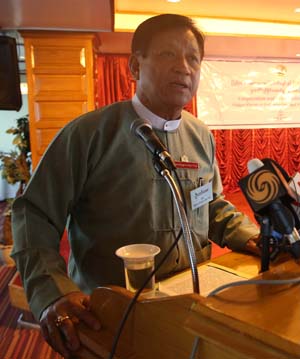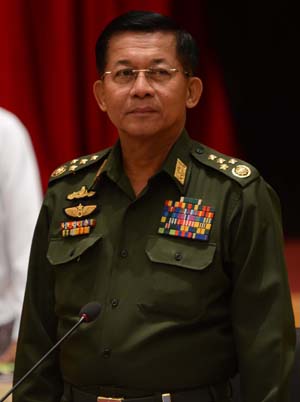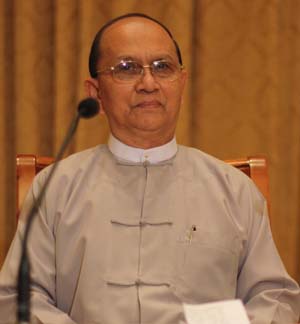In the months leading up to an election now less than three days away, much has been said about prospects for a free and fair poll in Burma. While the last two months of campaigning have made clear that the poll will not go down in history as a flawless exercise of the democratic process, many still believe the Nov. 8 vote offers the country its best shot at a credible election in 25 years.
Among those publically professing a commitment to ensuring a free and fair vote have been three men with formidable power—and much at stake—in the coming election. Here, The Irrawaddy looks back at some of the comments made in recent months by Burma’s president, election commission chairman and army chief, all of whom have pledged that they will do their part to administer the poll impartially and, just as importantly, respect its outcome.
“Our government vows to try our best to have clean, free and fair 2015 general elections, the first one held under a civilian government after many years.”
—during his monthly radio address to the nation on July 9, a day after Burma’s Union Election Commission (UEC) announced that the election would be held on Nov. 8
“The upcoming November poll will be free and fair, and we will try to have it be 100 percent peaceful, though there are challenges to making it 100 percent comprehensive,”
—in his last monthly radio address before the landmark vote on Sunday
 Tin Aye, chairman of the Union Election Commission (UEC)
Tin Aye, chairman of the Union Election Commission (UEC)
“I assure you, I will do my best. I know that people don’t believe the election will be free and fair. I will organize the election with witnesses. And if you still don’t believe me, I have no idea what to say. I will do my best. Everyone is keeping an eye on me. How can I cheat?”
—in an interview with The Irrawaddy in June
“I won’t let it happen; that the result of the election is not recognized by the military or a party. I will ensure a free and fair election. The result of the free and fair election must be accepted. I’ll defend that result at the risk of my life. Either kill me or put me behind bars if [they] don’t want to accept it.”
—in meeting on Oct. 5 with local election subcommissions, civil society organizations, political parties and local residents of Kale Township, Sagaing Division
“I don’t accept those unreasonable criticisms. I’ll ask you a question: Was the 2012 by-election free and fair? You tell me that. What did the international community say? Who held that election? Wasn’t it U Tin Aye?”
—in meeting with civil society organizations at the Park Royal Hotel in Rangoon on Aug. 31
 Snr-Gen Min Aung Hlaing, Burma Army commander-in-chief
Snr-Gen Min Aung Hlaing, Burma Army commander-in-chief
“We wouldn’t mind even if the NLD won in the next general election, as long as it is free and fair. The desire of the Tatmadaw [Burma Army] is to see the upcoming elections be held free and fair. We will approve and support the results announced by the Union Election Commission.”
—he told members of Burma’s Interim Press Council, a media support organization, during a meeting on Aug. 24
“I believe the election will be free and fair. That is our true wish. We are committed to helping make that happen any way we can. When the election commission announces the result, we have to respect it, because it will have been democratically done.”
—in an exclusive interview with the BBC broadcast on July 20
“There were two coups in the country, in 1962 and 1988. They were to fill a power vacuum at that time. But I personally dislike military takeovers. In short, I have no plans for a military coup [and] the military has no plans for it.”
—at a press conference in Naypyidaw on Sept. 21
“We, the army, have to do as much as we can to make sure the coming election is free and fair. We’ll do it to the best of our ability. We want the election to be free and fair. We will acknowledge whatever party wins the election. I’ve already said we would welcome the election result, so long as it is free and fair.”
—in meeting with the press on Sept. 21 in Naypyidaw
“We, the army, will make sure to the best of our ability to successfully hold a free and fair election.”
— in a meeting with Japanese Deputy Prime Minister and Finance Minister Taro Aso on Sept. 22 in Naypyidaw


















